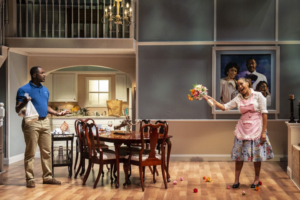Review Roundup: What Did Critics Think of FAIRVIEW at Woolly Mammoth Theatre Company?

The Pulitzer Prize winning play, Fairview, recently opened at Woolly Mammoth Theatre Company. Find out what critics had to say!
Season 40 kicks off with Fairview by Jackie Sibblies Drury, the 2019 Pulitzer Prize winner for Drama as well as a New York Times Best Theater of 2018 and TIME magazine Top 10 Plays and Musicals of 2018. Offering a richly layered examination of race, representation, and identity, Fairview demands freedom for people of color from the limitations of the white gaze. Fairview will be Woolly's second production of Drury's work, after We Are Proud to Present: A Presentation About the Herero of Namibia, Formerly Known as South-West Africa, From the German Sudwestafrika, Between the Years 1884-1915 (2014). Woolly's next show, The Movement Theatre Company's Production of What To Send Up When It Goes Down by Aleshea Harris and directed by Whitney White, continues the conversation about race in America with a community ritual that confronts the reality of anti-blackness. Described by the New York Times as "...fresh and original and in-the-moment life on the American stage" this piece will tour DC, beginning with venues at the forefront of black social and cultural life in the city, before landing at Woolly in the fall of 2019.
Check out the reviews below!
Amy Kotkin, DC Metro Theater Arts: Woolly Mammoth's incredible cast brings Drury's work fully to life. Nikki Crawford (Beverly), Samuel Ray Gates (Dayton) and Shannon Dorsey (Jasmine) not only click fully with their verbal banter, but under Walker-Webb's astute direction, they are balletic and precise with the movement (comedic and otherwise) required of their roles. Chinna Palmer, a recent Howard University graduate, shimmers as Keisha. Delicate as a butterfly and strong as a steel cable, she imbues this pivotal role with warmth, heart and a hesitant sort of bravery that keeps the audience in her thrall throughout. As the quartet of observers, Cody Nickell (Jimbo), Kimberly Gilbert (Suze), Christopher Dinolfo (Mack) and Laura C. Harris (Bets) are a manic, unstoppable force.
Peter Marks, The Washington Post: As the wild structure of "Fairview" also makes plain, this is messy, this notion of white people sharing their place at the control panels of the cultural conversation. The play, adroitly brought to comic life by director Stevie Walker-Webb, begins as a kind of familiar palliative a la TV's Huxtables: An affluent black family is preparing a birthday celebration for their elderly matriarch. The lovely Beverly (Nikki Crawford) and handsome Dayton (Samuel Ray Gates) await the arrival home of daughter Keisha, as well as of Beverly's sister, Jasmine (Shannon Dorsey), the family troublemaker. Dorsey infuses Jasmine with the giddily inflammatory inclinations of an emotional arsonist. She is out-and-out sublime.
Heather Rosen, Theatre Travels: The bright lights then dim and flash, signaling that chaos is about to ensue. Then something very interesting and unexpected happens - the above-mentioned characters replay the entire first part of the show in silence, mouthing their lines. This time around, instead of hearing the characters' banter, we hear a discussion between 3 or 4 people who we cannot see (although sometimes we see their shadows.) They sound white and affluent, and most of their accents are American, except for one who sounds European (which I thought was an interesting choice by either the playwright or the director). Their discussion is lengthy and frankly, fairly boring (unlike the witty dialogue that was written for the Frasiers), but they end up debating the pros and cons of being a member of races other than their own. Inevitably, these people, who are literally "behind the scenes," make some sweeping generalizations and assumptions about people of other races. It started to feel a little bit uncomfortable at this point, and I think that was intentional.
Norah Dick, MD Theatre Guide: Director Stevie Walker-Webb nicely choreographs this startling interlude. The viewers' commentary creates a finely-tuned tension between the actions of the black family on stage and the ongoing debate. Clever staging, dependent on Colin K. Bill's innovative lighting design, occasionally creates the perception that the viewers/voyeurs are in conversation with the sitcom "actors."
Photo Credit: Teresa Castracane
Add Your Comment
Videos
